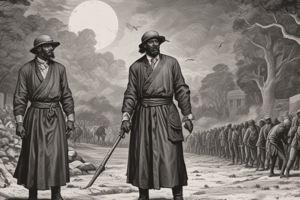Podcast
Questions and Answers
What was the reason for the anger of Northerners towards the Fugitive Slave Act of 1850?
What was the reason for the anger of Northerners towards the Fugitive Slave Act of 1850?
- It imposed harsh punishments on those who aided runaway slaves
- It prohibited the expansion of slavery into new territories
- It required all citizens to support the slave system (correct)
- It allowed slaves to sue their owners in court
What was the outcome of the Dred Scott decision?
What was the outcome of the Dred Scott decision?
- It prohibited the expansion of slavery into new territories
- It declared that slaves were entitled to freedom and equal rights
- It stated that slaves were the property of their owners and could not sue their owner in court (correct)
- It granted slaves the right to vote
Why did John Brown's raid on Harpers Ferry fail?
Why did John Brown's raid on Harpers Ferry fail?
- The arsenal at Harpers Ferry was well-defended
- He lacked the necessary weapons and ammunition
- Few Americans were willing to join a rebellion organized by him (correct)
- He was captured before the raid could take place
What did President Lincoln declare in his inaugural address?
What did President Lincoln declare in his inaugural address?
What was the impact of the Civil War on northern industries?
What was the impact of the Civil War on northern industries?
Who was executed for attempting to seize the arsenal at Harpers Ferry?
Who was executed for attempting to seize the arsenal at Harpers Ferry?
What did abolitionists believe about slavery?
What did abolitionists believe about slavery?
Why did the Fugitive Slave Act of 1850 anger Northerners?
Why did the Fugitive Slave Act of 1850 anger Northerners?
What did the Dred Scott decision state about slaves?
What did the Dred Scott decision state about slaves?
What did President Lincoln declare in his inaugural address about states leaving the Union?
What did President Lincoln declare in his inaugural address about states leaving the Union?
Flashcards are hidden until you start studying
Study Notes
The Road to the Civil War
The Fugitive Slave Act of 1850
- Northerners were angry about the law because it required them to assist in the capture and return of escaped slaves, violating their personal liberties and morals.
- The law allowed slave catchers to pursue and capture escaped slaves in the North, causing widespread resentment.
The Dred Scott Decision
- The Supreme Court ruled that slaves were not citizens and had no right to sue in court, denying them equal protection under the law.
- The decision declared that Congress had no power to regulate slavery in the territories, leading to a rise in tensions between pro-slavery and anti-slavery factions.
John Brown's Raid on Harpers Ferry
- John Brown's raid failed because he underestimated the strength of the federal troops and the local militia, leading to his capture and eventual execution.
- Brown's raid was an attempt to spark a slave rebellion and create a free state in the South.
President Lincoln's Inaugural Address
- President Lincoln declared that the Union must be preserved and that secession was not a viable option for states wanting to leave the Union.
- He emphasized that the Union was perpetual and that the Constitution did not provide for its dissolution.
The Impact of the Civil War on Northern Industries
- The war stimulated industrial growth in the North, as factories produced war materials, uniforms, and other supplies.
- The war also led to the development of new technologies and manufacturing processes.
Execution of John Brown
- John Brown was executed by hanging for treason against the state of Virginia for his attempted raid on Harpers Ferry.
Abolitionist Beliefs
- Abolitionists believed that slavery was morally wrong and incompatible with American democratic values.
- They advocated for the immediate and complete emancipation of all slaves.
Studying That Suits You
Use AI to generate personalized quizzes and flashcards to suit your learning preferences.




